The following review is the 17th, 18th, and 19th installment of my series searching for “SF short stories that are critical in some capacity of space agencies, astronauts, and the culture which produced them.” Some stories I’ll review in this series might not fit. Many are far from the best. And that is okay. I relish the act of literary archaeology.
Reinvigorated by the positive response to my last post in my series, I turn now to an author, Alfred Coppel (1921-2004), whom I’ve only infrequently explored. Track down his post-apocalyptic masterpiece, of the “realistic” variety, Dark December (1960) if you haven’t already. As I was in the Coppel reading mood, I included an extra tale on a different theme.
As always, feel free to join the conversation and read along with me on the search for the depressed astronaut.
Previously: John D. MacDonald’s “The Flaw” (1949)
Up Next: Harlan Ellison’s “Psycho at Mid-Point” (1956)

Ed Emshwiller’s cover art for Fantastic Story Magazine, ed. Samuel Mines (Fall 1952)
3.5/5 (Good)
Alfred Coppel’s “The Hunters” first appeared in Fantastic Story Magazine, ed. Samuel Mines (Fall 1952). You can read it online here.
“The Hunters” imagines a world after humanity has voyaged to the stars. Or rather, after humanity figured out that they were not suitable for the stars–a simulacrum of the human was required instead. Felti hides from the hunters–Grancor and Corday–on a “twisted, tortured world that had not died with dignity” (107). An archaeologist by trade who studied the culture that started the exploration of the cosmos, Felti felt the pull of this shattered place despite its “acrid tang of radiation” (107). But he was on the run! The “Psychoanalyzer” required Felti’s reconditioning (107).
Wandering through the ruins Felti feels a “sort of fulfillment” amongst the fragments of paintings and sculpture. He imagines the “lilting voices” of those that had lived and created and dreamed (108). He self-justifies his actions and his unique ability to kill as a reversion to “the type that had spawned his race and set it out to conquer the stars. To the type that had died here on this lonely world and been forgotten” (108). He would kill again to stay amongst the wreckage of the past.
In order to examine how it fits into this series, I have to reveal the twist. Felti and his pursuers are androids. The following grand historical narrative emerges: humanity could not leave the Earth and instead created androids to explore and settle for them. As mechanical beings, as long as the resources could be found they replicated and spread from world to world forgetting about their human ancestors. And nuclear war obliterated humanity anyway….
This story fits all the pulp parameters. There’s a chase. There’s violence! There’s shattered metal! But there’s also the mournful sense that the frail human body cannot escape our Earthly prison. And the patterns of violence will all circle back again.
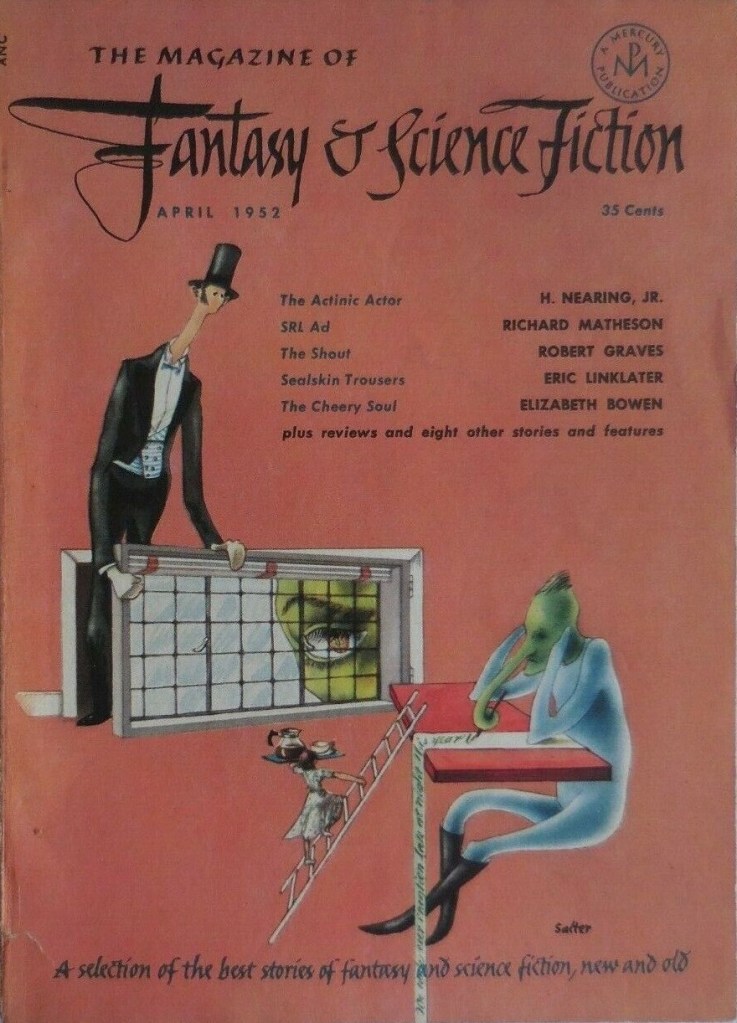
George Salter’s cover for The Magazine of Fantasy and Science Fiction (April 1952)
4/5 (Good)
Alfred Coppel’s “The Dreamer” first appeared in The Magazine of Fantasy and Science Fiction, ed. Anthony Boucher, Jr. and Francis McComas (April 1952). You can read it online here.
Decked out in a pressure suit, Denby, an astronaut in training, approaches the spaceships looming majestic on the horizon: “This, he thought, is what I was born for” (39). A psychologist (one of the few well-meaning ones I’ve encountered in science fiction as of late) trails behind him with a syringe. Denby regals him with the power held by those dreams–a power that propelled him through his loneliness: “I was different. I was alone always, and the dream was my only companion. I read and thought and wondered and wanted. Now I’m having my chance to make it mean something” (40). The psychologist’s probing reveals the extent of his black loneliness. The dream, fostered by implication through pulp science fiction, blocked out the dismissive judgement of his parents (40). And now, he could taste triumph!
Inside of the spaceship cockpit he activates the telescreens. With the “unreal brilliance” of the sun in his eyes and the “brittle starkness of space,” he suddenly felt the existential dread of cutting the tether from his memories and connection to earth (41). And true loneliness lays its “hideous, mind-cracking” grip upon him (41). He realizes that “the stars belong to the clods, the dull ones. They can face real loneliness. For them it has no meaning and therefore no terrors” (42).
“The Dreamer” is the story the inspired my quest to find more Coppel works that fit the parameters of this project. An effective and powerful take on those that cannot make it to space–dreams are not enough. I suspect Coppel draws on his own military experiences. There’s the earthy sense that the promise and feel of American triumph after WWII meant something a bit different as the Cold War bloomed in the early 50s. Coppel’s stories are filled with brittle male characters who struggle to find themselves in strange new worlds.
Recommended.

Richard Powers’ cover for Galaxy Science Fiction (February 1952)
3/5 (Average)
Alfred Coppel’s “Double Standard” first appeared in Galaxy Science Fiction, ed. H. L. Gold (February 1952). You can read it online here.
Two preliminary notes: one could make the argument that “Double Standard” does not completely fit the parameters of this series. Coppel renders a dystopia created by the advent of space travel but relates the first step in destroying the rigid perimeters of those who can leave the confines of Earth. Unusual for the stories I’ve covered in this post, there’s a distinct sense of hope that peers through the oppressive gloom and loneliness. Second, there’s a twist ending so reader beware.
Kim Hall, or rather someone taking on the name, receives extensive and illegal plastic surgery to inhabit a strange new body. For his entire life he had “dreamed only of the lands in the sky” and the alien geographies of the celestial bodies (24). In this dystopian future controlled by a Eugenics Board, two groups receive permission to journey into the skies: “big muscle boys” as they are “tough breeders” (26) and women due to their low “mass and [high] durability” (27). Unfortunately, the main character does not fit the characteristics of either group: “I and half the human race were on the wrong side of the line” (27). His plastic surgery initially eludes the authorities until moments before takeoff…
There are elements of this story that I enjoyed. While far from a modern appeal to equality, Coppel does acknowledge the historical oppression of women—“for centuries we kept you in subjection and when the Age of Space came, you found your place” (29)–and concludes with a plea that “we can all be free” (29) and everyone with the dream should be able to explore the stars. In the end, “Double Standard” is not as well told as “The Dreamers” and relies on a rather silly gimmick to old its threads together.
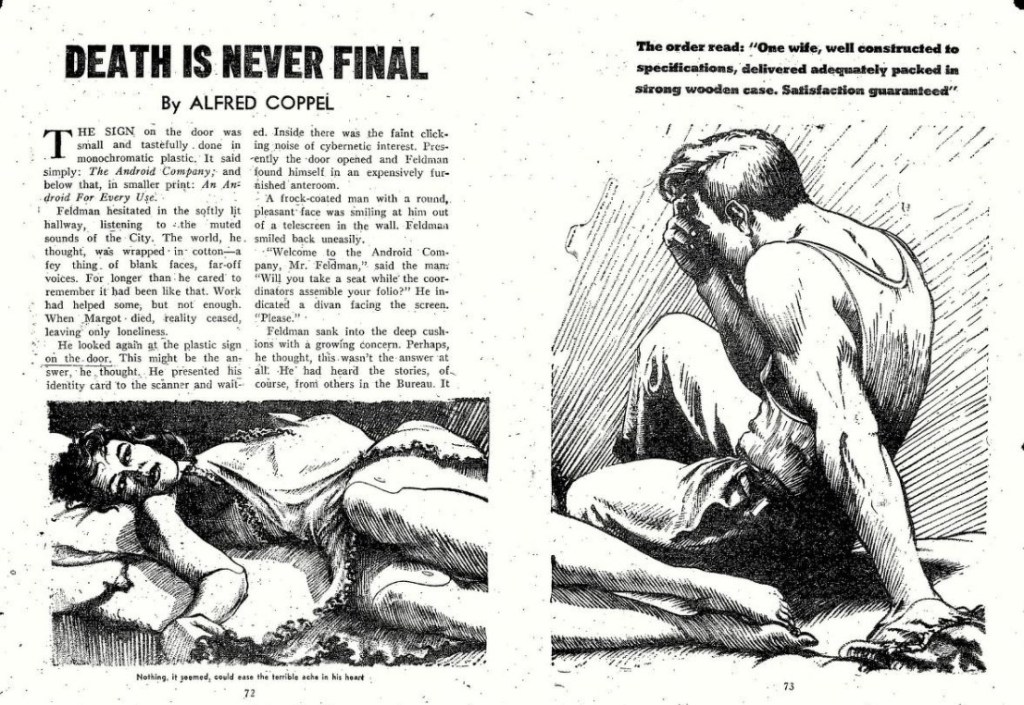
Gaylord Welker’s interior art for Alfred Coppel’s “Death Is Never Final” in Fantastic Adventures, ed. Howard Browne (October 1952)
3/5 (Average)
Alfred Coppel’s “Death Is Never Final” first appeared in Fantastic Adventures, ed. Howard Browne (October 1952). You can read it online here.
A sinister metaphor of loneliness sets the scene: “The world, he thought, was wrapped in cotton–a fey thing of blank faces, far-off voices” (73). Feldman, an assistant director of the Bureau of Political Orientation, suffers deeply from the death of his wife three years earlier. Indrawn, lonely, and traumatized, Feldman turns to the originally named Android Company for a replacement lover and companion. Vat-grown to his specifications, and named after his mother, Miriam satiates all his needs. But Feldman soon discovers that various androids populate the halls of the Bureau of Political Orientation and the beforementioned company. The replacement will be painless. Miriam will love and give all until he dies–in her arms. Humanity’s retreat is voluntary. Their designated replacements only need to wait for the inevitable.
Coppel’s general pessimism about humanity’s future is fully on show. Feldman is powerless to prevent the non-violent takeover. A takeover rooted entirely in humanity’s inability to come to grips with its traumas and despair. This isn’t a mind-blowing story by an stretch of the imagination but is, at its core, an unusual account of kind conquest. And of humanity’s frail acquiescence in the face of cataclysmic change.
Somewhat recommended for fans of muted tales of androids and endings.
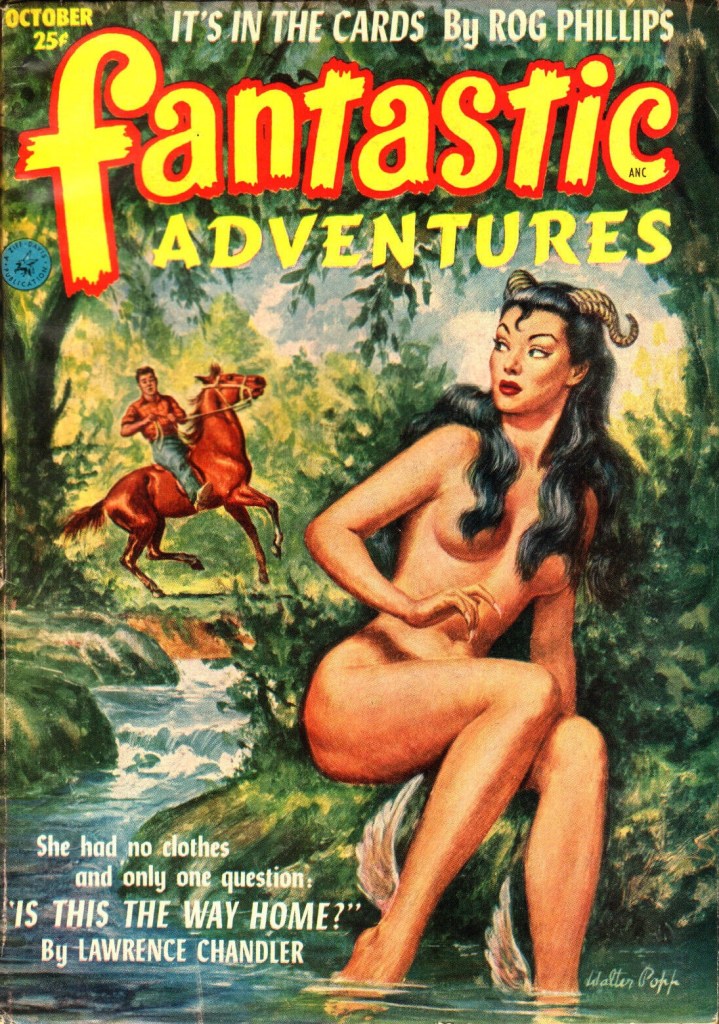
Walter Popp’s cover for Fantastic Adventures (October 1952)
For book reviews consult the INDEX
For cover art posts consult the INDEX
For TV and film reviews consult the INDEX
I’ve only read one Alfred Coppel story for sure: ‘Defender Of The Faith’ (1952). And I liked it according to my notes. I’m not sure why without looking further. I think I want to at least read ‘The Hunters’ and ‘The Dreamer’ before I read any more of this post, so I will report back, hopefully…
It turns out I have read ‘The Dreamer’, but I can’t recall it. It’s short, so I’ll have another look. Luckily I have a copy in this:
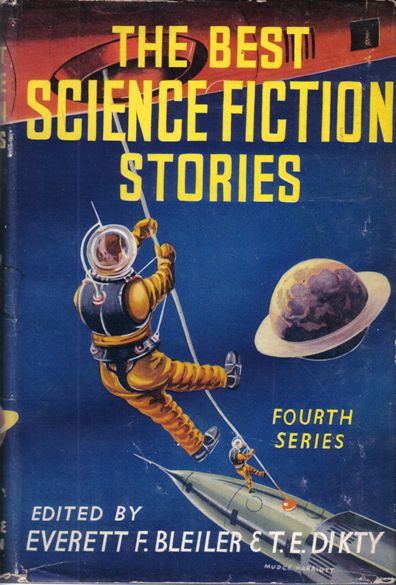
I’ve always wanted that series! Of course, I am more partial to the ones with the 1st edition covers
https://www.isfdb.org/cgi-bin/pl.cgi?35919
I’d love to get my hands on the unexpurgated US first edition. But it’s fairly expensive these days, or at least the last time I checked. Over here in Australia you’re more likely to come across UK editions second hand because of the way the Australian book trade has long been tied to the UK. Not to mention, I’ve been purchasing less second hand material from outside of Australia since covid, due to books that I ordered going missing during transit. This had never happened to me before 2020, and then it happened no less than three times in a row during 20/21.
They are somewhat pricey here too. I should add them all to my Amazon list and wait for cheaper copies to crop up….
And if you saw an earlier version of this comment with links, I was momentarily confused and thought you were talking about his novel Dark December! Sorry.
Oh yeah, a little confused!
I started off years ago buying the US editions of Bleiler & Dikty’s ‘The Best Science Fiction Stories’, and managed to bag the first three fairly cheaply. But now the prices have skyrocketed. The expurgated UK editons are a little cheaper over here, though I haven’t looked for a few months.
I will look around for ‘Dark December’. Your comments and review definitely piqued my interest. But post-apoc fiction is a little off of my radar for the minute, while I attempt to cope with the current unfolding of the apocalypse…
Sorry!
Sometimes I think my tendency of reading everything as a historical document detaches me from the idea that these are extrapolated futures and at all related or connected to the modern era… and our slide into apocalyptic landscapes of all varieties.
Rescued by the historical gaze! 🙂
I was thinking about adding “Defender of the Faith” as a the bonus story to this review. I read the first page when I was skimming through a bunch of magazines for his 1952 short stories. But when I saw “Death Is Never Final” I felt it matched the emotional landscape of the other stories.
Ok, now I’ve read ‘The Hunters’, reread ‘The Dreamer’, and finished your review. I love the way fake reality arises in these stories: the robot ‘simulacrums’, the faked rocket mission, the “faked” man (I presume), and the faked mother-lover. Sort of like Philip K Dick but less neurotic! This obsessive concern with the fictional nature of reality really jumps out at you. Or to me at least.
Interestingly, I’ve worked out I read an Alfred Coppel novel in my teens in the 1980s: ‘The Burning Mountain’ (1983). This is the copy I thumbed:
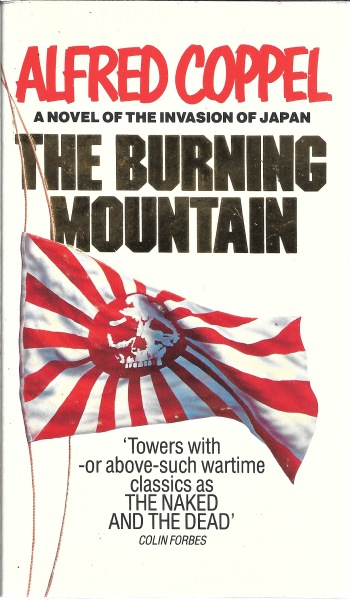
Appropriately, its alternative history. What if the A-bombs weren’t ready and the US and its allies had to mount a seaborne invasion of Japan? I lapped it up at the time, as I dimly recall the brutality of the piece.
PKD but less neurotic, I like that. And I’m fine with that. Over what I’ve read so far, I’ve found two elements of his work appealing — the very effective (and not in a flashy way) prose and the general loneliness. I recommend his novel Dark December if you’re in the mood. The main character worked at a nuclear launch facility and feels guilty at the destruction he caused. He struggles with his newfound pacifism in his quest to find his wife when presented with the violence of the post-apocalyptic landscape… Great stuff.
They all sound like stories I want to read. Thanks, Dr. B!
If you get to one of them, let me know what you think!
I read “The Hunters”, I haven’t read anything by him before. He writes in quite a good prose style. We are made to feel sorry for the androids, who don’t seem to know they are. As was said above, it did remind me of Philip K. Dick. This was published at about the time he started writing, but not about androids or mechanical life yet.
Yeah, the well-crafted nature of his prose comes through in each of the stories — even if the plots/ideas are less interesting in some of the others.
I recommend Dark December (1960) if you’re in the post-apocalyptic mood and apparently (even if my memory has faded a bit) “Last Night of Summer” (1954) was fascinating as well. What I wrote in my review from 2012: ‘Last Night of Summer’ (1954) (10 pages) Alfred Coppel 4/5 (Good): A temperature spike due to various astronomical occurrences threatens to wipe out all but one million of Earth’s inhabitants who can fit in specially designed burrows. Only selectively distributed disks will allow entry into the burrows. The rest of humanity resorts to drugs, raucous parties, and the like. Our hero’s wife kills a man for his disks in order to save herself…. But should he save his wife and himself or their two daughters? Coppel’s vision is vividly conveyed — the impending disaster seems real as are the all too human reactions of the majority who will not be saved. The end is poignant and unforced. Worth reading.
As I noted elsewhere, I really enjoyed — in its deliberately pulpy way — Coppel’s “The Rebel of Valkyr” (Planet Stories, Fall 1950), as well as its pseudonymous expansion as a four volume YA series, beginning with THE REBEL OF RHADA (1968, as by “Robert Cham Gilman”.) Probably not your sort of thing, though.
I already knew his name, because of his 1974 non-SF bestseller, THIRTY-FOUR EAST, and his latterday return to SF with GLORY and its sequels (in the ’90s.)
He was one of the earliest Hispanic writer to make a name in SF, I think.
“The Dreamer” looks very good. Also, I loved George Salter’s art direction for the early F&SF, and his covers.
Hello Rich, I hope you are doing well. I’m waiting for more older SF reviews on your site! muahaha
I am intrigued by Coppel’s early work so I can imagine eventually reading some of his very first short stories — like “The Revel of Valkyr” (1950). As for the others you mention, you are correct that I am far less interested.
Re-your comment about Hispanic authors: He’s one of the earliest I know. I might be missing someone.
Let me know what you think about “The Dreamer” if you get around to reading it. All the Coppel’s stories I’ve read so far tend to be on the short side — under 10 pages.
I’ll have a copy of that issue of F&SF coming soon!
(By the way, I’ll be in Indianapolis this weekend (well, in Carmel) — though this isn’t the most convenient weekend!)
Our visitors are leaving Saturday morning — so… despite the weekend not being super convenient, if you wanted to quickly grab a beer (or something) Saturday or Sunday just let me know. I can journey up to the suburban wasteland of Carmel (traffic circle world) if needed. Hey, you know me and suburbs… haha.
The first time I encountered traffic circles in quantity was in Carmel, after my brother moved there. He has since moved to more or less “downtown” Carmel (his kids having moved out so they could downsize) where there are fewer traffic circles. (There’s actually a famous traffic circle in St. Louis — at an intersection of 3 streets so there are six entry/exits. I used to navigate it all the time because it was on the way from my apartment to my (future) wife’s place while we were dating. But that was the only one until the last few years when they started popping up.)
I’d love to get a beer sometime but we have to leave early Saturday to get to my daughter’s place. But I’ll be in Carmel again sometime and I’ll look you up then!
I read somewhere that the circles radically reduced the number of accidents and sped up commute time. But yeah, the first time you drive into Carmel and are besieged by constant circles it’s quite disconcerting.
Sounds good!